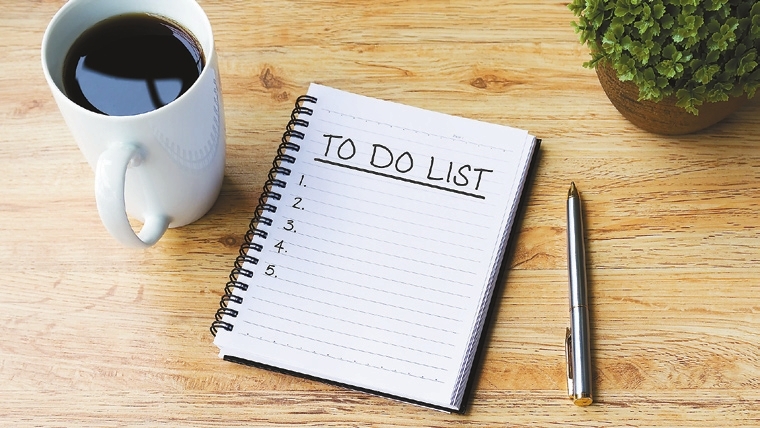
IN a time when it seems like we may have less to do, a to-do list actually could be quite helpful. As the days blend together for many people living in lockdown, crossing things off a to-do list can feel even more satisfying. To-do lists can be great tools for decreasing anxiety, providing structure and giving us a record of everything we’ve accomplished in a day. The trick is to reframe your to-do list as a set of miniature goals for the day and to think of your checklist items as steps in a plan. Research on the psychology of goal-making has revealed that an unfinished goal causes interference with other tasks you’re trying to achieve. But simply making a plan to facilitate that goal, such as detailing steps on a to-do list, can help your mind set it aside to focus on other things. “Goals are interesting as they are almost these autonomous agents that kind of live inside you and occupy space in your mind,” said E.J. Masicampo, an associate professor of psychology at Wake Forest University in Winston-Salem, North Carolina, the United States. “When a goal is unfinished it might be a weight on your mind in terms of anxiety or worry and it colors how you see the world, because it’s sort of tugging at the sleeve of your conscious attention,” Masicampo said. “It can be omnipresent whether you’re aware of it or not.” People with unfinished short-term goals performed poorly on unrelated reading and comprehension tasks, reported a 2011 study in the Journal of Personality and Social Psychology by Masicampo and research co-author Roy Baumeister, a professor of psychology at the University of Queensland. But when the 2011 study participants were allowed to formulate specific plans for their goals before moving onto the next task, those negative effects were eliminated. “We were able to find that you don’t have to finish the goal to offload it — you really could just make a specific plan for how to attain it to get it to stop occupying that mental space,” Masicampo said. But Masicampo cautioned that it won’t help to offload your mental burden by jotting it down on a list “without actually making a plan.” “To-do lists often tend to be mental graveyards, but that said I think there’s some relief there,” Masicampo said, adding that sub-goals are important. “Something that’s been sitting there for too long is probably just stated in too big terms.” In order to work effectively, your to-do list’s mini-goals also need to be well defined and have short time frames. That’s because people tend to give up in the middle of goals, according to psychologists. One place people get stuck is exercise, but a goal to exercise half the days each week will be easier to stick to than exercising half the days each month. Even then, exercise will make it onto your to-do list more often at the beginning and end of the week — but it’s difficult to motivate yourself on Wednesday. “We celebrate graduations at work and cheer when we finish big projects. But there is no celebration for middles. That’s when we both cut corners and we lose our motivation,” said Ayelet Fishbach, a professor of behavioral science and marketing at the University of Chicago who is an expert on motivation and decision-making. To-do lists also need to be flexible. If your plans change or get interrupted by an endless flurry of WeChat calls, it’s important to recognize that’s not the end of the world. For all the structure and stress reduction that to-do lists can provide, they can sometimes add to anxiety. That’s because tasks on your to-do list that linger for weeks or months are bad for mental health and motivation. Do you want to complete extra work-related tasks aiming for a promotion and cook dinner for your family that night? Cue goal conflict. Conflicting goals can create stress and even that overwhelming feeling that there aren’t enough hours in the day. To use a to-do list the right way, people need to clearly define their goals and differentiate the tasks they definitely want to get done today versus tasks they want to do “maybe someday.” Finally, having a productive to-do list shouldn’t make you feel like you can’t take a break, even if you haven’t crossed all those items off your list yet. To-do lists can be great tools to keep us going during this time of coronavirus boredom, uncertainty, and pandemic anxiety, but it’s important to not fill up your leisure time with productivity. Remember that one of the most important tasks we can add to our daily list is rest. (SD-Agencies) | 
